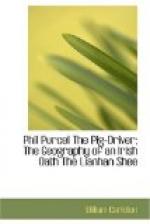* Of the origin of this singular superstition I can find no account whatsoever; it is conceived, however, in a mild, sweet, and hospitable spirit. The visits of these migratory little creatures, which may be termed domestic grasshoppers, are very capricious and uncertain, as are their departures; and it is, I should think, for this reason, that they are believed to be cognizant of the ongoings of human life. We can easily suppose, for instance, that the coincidence of their disappearance from a family, and the occurrence of a death in that family, frequently multiplied as such coincidences must be in the country at large, might occasion the people, who are naturally credulous, to associate the one event with the other; and on that slight basis erect the general superstition. Crickets, too, when chirupping, have a habit of suddenly ceasing, so that when any particularly interesting conversation happens to go on about the rustic hearth, this stopping of their little chaunt looks so like listening, that it is scarcely to be wondered at that the country folks think they understand every word that is spoken. They are thought, also, to foresee both good and evil, and are considered vindictive, but yet capable of being conciliated by fair words and kindness. They are also very destructive among wearing-apparel, which they frequently nibble into holes; and this is always looked upon as a piece of revenge, occasioned by some disrespectful language used towards them, or some neglect of their little wants. This note was necessary in order to render the conduct and language of Mary Sullivan perfectly intelligible.
At this moment, the shadow of a person passing the house darkened the window opposite which she sat, and immediately a tall female, of a wild dress and aspect, entered the kitchen.
“Gho manhy dhea ghud, a ban chohr! the blessin’ o’ goodness upon you, dacent woman,” said Mrs. Sullivan, addressing her in those kindly phrases so peculiar to the Irish language.
Instead of making her any reply, however, the woman, whose eye glistened with a wild depth of meaning, exclaimed in low tones, apparently of much anguish, “Husht, husht’, dherum! husht, husht, I say—let me alone—I will do it—will you husht? I will, I say—I will—there now—that’s it—be quiet, an’ I will do it—be quiet!” and as she thus spoke, she turned her face back over her left shoulder, as if some invisible being dogged her steps, and stood bending over her.
“Gho manhy dhea ghud, a ban chohr, dherhum areesh! the blessin’ o’ God on you, honest woman, I say again,” said Mrs. Sullivan, repeating that sacred form of salutation with which the peasantry address each other. “‘Tis a fine evenin’, honest woman, glory be to him that sent the same, and amin! If it was cowld, I’d be axin’ you to draw your chair in to the fire: but, any way, won’t you sit down?”
As she ceased speaking, the piercing eye of the strange woman became riveted on her with a glare, which, whilst it startled Mrs. Sullivan, seemed full of an agony that almost abstracted her from external life. It was not, however, so wholly absorbing as to prevent it from expressing a marked interest, whether for good or evil, in the woman who addressed her so hospitably.




